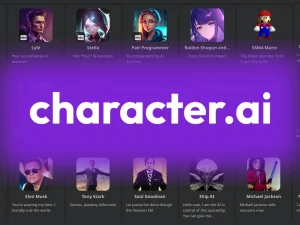Reaching you through the Labyrinth-of-AI-and-IP-II
The world of character AI chat technology combined with the intersection of intellectual property (IP) rights is a complex environment for creators, users and legals. AI is projected to become a $500 billion global market by 2024 and therefore, the need to safeguard and comprehend an IP in this field has never been more important.
IP Roadblocks With AI Characters
Most intellectual property issues occur with respect to AI-generated content creation, usage, and dissemination. Here are the focal points:
Developers may draw on a wealth of data, like pre-existing literature, media, and artworks to train AI models for creating AI characters. This process potentially can violate the copyright of the data sources- especially when not used according to rules regarding licensing rights.
Ownership of AI-Generated Content: Ascertaining who rightfully owns the creations inspired by AI poses a huge challenge. What happens if an AI writes a book or music, and who owns the IP is a question that needs sound legal clarification - was it the developer, was it the AI itself, was it the user that initiated its use? To date, most AI is not recognized as an independent creator by jurisdictions, thus ownership rights lie with developers or the party who commissioned the work.
Regulation and Best Practices
Human Rights Concerns Several countries are moving to set up legal..
Copyright Laws: At the time of writing this, only human-created works are protected under copyright laws in the United States and the European Union. Nonetheless, continuing conversations and potential legislative changes are seeking to unpack the particulars with AI-generated content.
Patents and Trademarks: AI can also influence patents and trademarks. AI creations may also fall under the criteria of patentability or filing for a trademark, as seen with the AI-generated inventions or company names, further obfuscating classic definitions and necessities.
Character ai chat: Privacy Concerns - Building personalization tools using AI systems like character ai chat requires input in the form of data mainly such as user interactions, things to personalize, etc. Thus in order to generate or customize content from this data while ensuring that it is processed securely and transparently a lot of privacy concerns need to be addressed so that they comply with privacy laws such as GDPR in Europe or CCPA in California.

Strategies for an IP Protection Approach
Here are some of the ways that companies and creators can strategically navigate IP:
License: AI-licensing; set clear licensing conditions & any IP rights over the AI-products, liability provisions when using datasets or other materials needed to train AIs.
User Agreement (IP Clauses): Companies should incorporate detailed provisions as part of their User Agreements, specifying who the owner would be of content/output generated by AI and also enabling the use of AI tools.
An Active Engagement with Legal Developments: You must stay up to date with the latest legal developments in the field of intellectual property, and as pertaining to AI. VuittonThe participation in dialogues and the lobbying to ensure that policies are shaped keeping pace with technology developments
The Road Ahead
And, as technologies involving character AI continue to grow and thrive so also will the legal landscapes regulating intellectual property. To unlock the range of possibilities that AI technologies can deliver, it will take not only an informed stakeholder community, but a proactive one ready to tackle IP challenges in a respectful and protective way for all stakeholders involved. Our Copyright Infringement Lawyer recommends hiring a lawyer for IP & technology law to successfully move through this area of uncertainty.